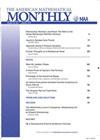数学中的群体与归属*
IF 0.4
4区 数学
Q4 MATHEMATICS
引用次数: 0
摘要
本文章由计算机程序翻译,如有差异,请以英文原文为准。
Community and Belonging in Mathematics*
Abstract Mathematical communities which support women and members of underrepresented groups in mathematics can increase the likelihood of their earning advanced degrees in mathematics. Mathematicians should be investing more time, energy, and funding into supporting mathematical communities that exist and creating ones that are needed. Through the story of the Carleton Summer Mathematics Program for Women, we demonstrate that building such a community doesn’t need to be difficult, and it can be quite rewarding.
求助全文
通过发布文献求助,成功后即可免费获取论文全文。
去求助
来源期刊

American Mathematical Monthly
Mathematics-General Mathematics
CiteScore
0.80
自引率
20.00%
发文量
127
审稿时长
6-12 weeks
期刊介绍:
The Monthly''s readers expect a high standard of exposition; they look for articles that inform, stimulate, challenge, enlighten, and even entertain. Monthly articles are meant to be read, enjoyed, and discussed, rather than just archived. Articles may be expositions of old or new results, historical or biographical essays, speculations or definitive treatments, broad developments, or explorations of a single application. Novelty and generality are far less important than clarity of exposition and broad appeal. Appropriate figures, diagrams, and photographs are encouraged.
Notes are short, sharply focused, and possibly informal. They are often gems that provide a new proof of an old theorem, a novel presentation of a familiar theme, or a lively discussion of a single issue.
Abstracts for articles or notes should entice the prospective reader into exploring the subject of the paper and should make it clear to the reader why this paper is interesting and important. The abstract should highlight the concepts of the paper rather than summarize the mechanics. The abstract is the first impression of the paper, not a technical summary of the paper. Excessive use of notation is discouraged as it can limit the interest of the broad readership of the MAA, and can limit search-ability of the article.
 求助内容:
求助内容: 应助结果提醒方式:
应助结果提醒方式:


